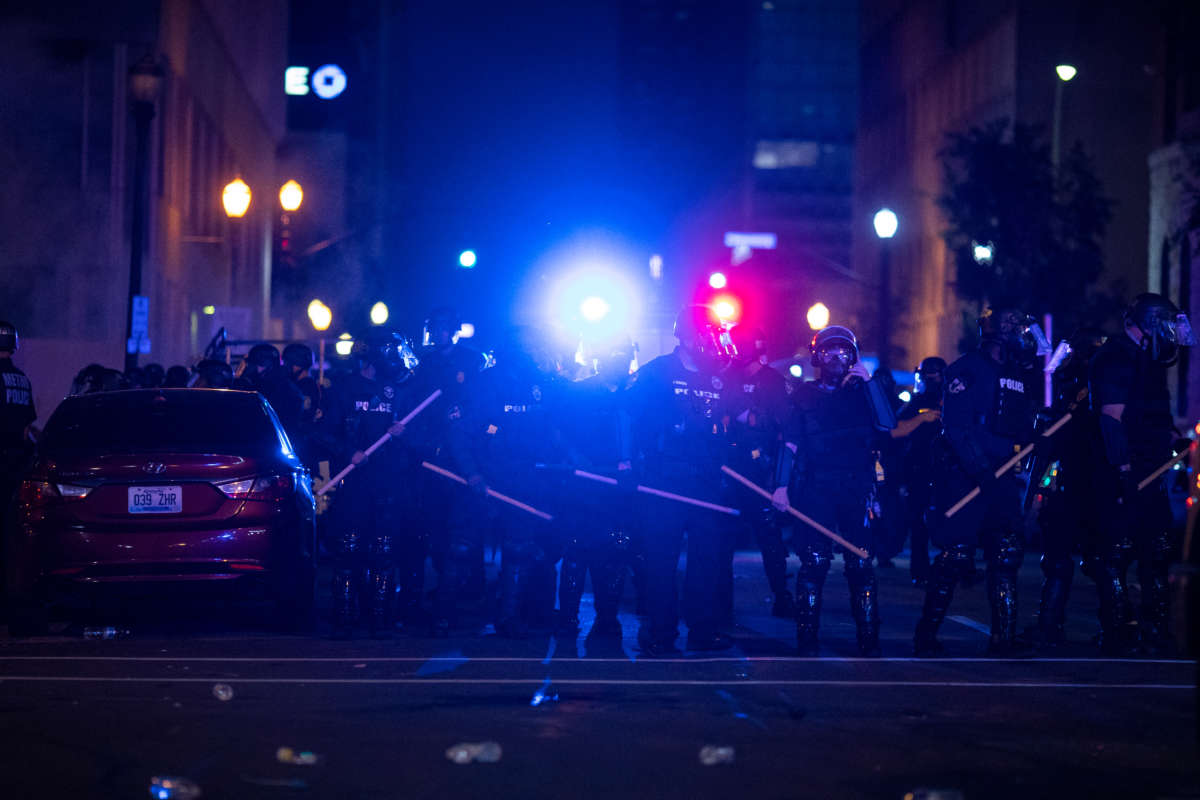A 53-year-old Black business owner in Louisville, Kentucky, was killed by police gunfire early on Monday morning during protests in that city, as law enforcement attempted crowd control in the neighborhood near his barbecue business.
David McAtee, 53, was considered a “community pillar” partially due to the popularity of his restaurant, Yaya’s BBQ, in western Louisville. McAtee, who was in business for decades, would often serve free meals to police officers who frequented his establishment.
The Louisville Metropolitan Police Department (LMPD) and the National Guard were attempting to disperse a gathering of people near McAtee’s place of business — part of the nationwide uprisings in response to the killing of George Floyd at the hands of Minneapolis, Minnesota, police last week.
LMPD claimed a shot was fired toward them, resulting in their returning fire into the crowd. One of their bullets ended up hitting McAtee, killing him early Monday morning, though no attempt was made to remove his body from the street where it lay until at least noon that day.
Unarmed black man #DavidMcAtee was murdered on Monday by @LMPD. His body was in the street for 12 hours.
McAtee was the owner of Yaya’s BBQ in Loiuisville, Kentucky, and gave free food to people in need including policeman. Our prayers go out to his family. #BlackLivesMatter 🖤 pic.twitter.com/WXWUC6KhzM— MEFeater Magazine (@mefeater) June 2, 2020
The shooting is currently under investigation from several different levels of government.
Louisville Mayor Greg Fischer, commenting on the matter, announced that Chief of Police Steve Conrad was fired because of what happened, particularly because no member of law enforcement involved in the shooting had their body cameras turned on at the time.
“This type of institutional failure will not be tolerated,” Conrad said.
Kentucky Gov. Andy Beshear similarly chastised the lack of body cams. “This is the entire reason that we have those cameras,” he said.
While Fischer’s and Beshear’s comments may be genuine, many have noted in the past that body cameras don’t provide the fail-safe that political leaders say they do. Evidence is gathered, sometimes, as a result of wearing them, but as past events have demonstrated, even in incidents where a camera clearly shows a civilian being killed by an officer (such as the case of Eric Garner), it doesn’t necessarily result in justice for those who are harmed or for their families. There is scant evidence, too, that body cameras deter police violence, suggesting their effect on reducing such incidents is minimal, at best.
McAtee’s killing comes at a time when Louisville is still grieving over the death of another Black citizen earlier this year at the hands of police, 26-year-old Breonna Taylor.
Police burst into Taylor’s home in March with a warrant to search the premises, but didn’t announce who they were prior to their arrival. Because of their sudden rush into the doorway, Taylor’s boyfriend, who legally owned a firearm, believed that there were intruders breaking into their home, according to accounts from Taylor’s family, and fired his weapon. Police fired back, shooting and killing Taylor in the process.
Our most important fundraising appeal of the year
December is the most critical time of year for Truthout, because our nonprofit news is funded almost entirely by individual donations from readers like you. So before you navigate away, we ask that you take just a second to support Truthout with a tax-deductible donation.
This year is a little different. We are up against a far-reaching, wide-scale attack on press freedom coming from the Trump administration. 2025 was a year of frightening censorship, news industry corporate consolidation, and worsening financial conditions for progressive nonprofits across the board.
We can only resist Trump’s agenda by cultivating a strong base of support. The right-wing mediasphere is funded comfortably by billionaire owners and venture capitalist philanthropists. At Truthout, we have you.
We’ve set an ambitious target for our year-end campaign — a goal of $125,000 to keep up our fight against authoritarianism in 2026. Please take a meaningful action in this fight: make a one-time or monthly donation to Truthout before December 31. If you have the means, please dig deep.
